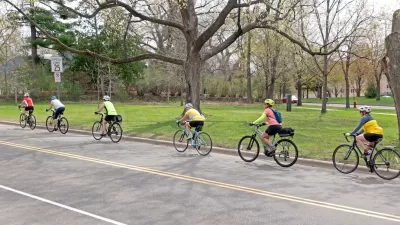A case study of suburban poverty and the programs needed to help residents through tough times.
Jessie Van Berkel reports on the persisting need for free meal programs in the suburbs of the Twin Cities region—despite the improving economy.
To illustrate the scope of the challenge Van Berkel cites the following statistics: "The number of children receiving free and reduced lunch last year had increased 35 percent, on average, in large suburban school districts since the height of the recession during the 2008-2009 school year, Minnesota Department of Education data show. Public schools in St. Paul and Minneapolis saw respective increases of 1 percent and 5 percent postrecession."
That comparison to schools in the region's inner cities ties to a larger point about the suburbanization of poverty, which is emerging as a trend in regions all over the country, including the Twin Cities. One of the challenges inherent to suburban poverty is how it can remind "out of sight and out of mind." Van Berkel quotes Anika Rychner, director of self-sufficiency at 360 Communities, a nonprofit primarily serving Dakota County, to explain how this dynamic plays out in suburban communities: "You could live in the community and never have to look at and acknowledge the need….Poverty doesn't look the same in the suburbs, but it's definitely here."
The article includes special attention to the efforts of Loaves and Fishes—a non-profit that has opened six new suburban dining site in the metro area in the past two years.
FULL STORY: Free meal program expands with the 'suburbanization of poverty'

Planetizen Federal Action Tracker
A weekly monitor of how Trump’s orders and actions are impacting planners and planning in America.

Maui's Vacation Rental Debate Turns Ugly
Verbal attacks, misinformation campaigns and fistfights plague a high-stakes debate to convert thousands of vacation rentals into long-term housing.

Restaurant Patios Were a Pandemic Win — Why Were They so Hard to Keep?
Social distancing requirements and changes in travel patterns prompted cities to pilot new uses for street and sidewalk space. Then it got complicated.

In California Battle of Housing vs. Environment, Housing Just Won
A new state law significantly limits the power of CEQA, an environmental review law that served as a powerful tool for blocking new development.

Boulder Eliminates Parking Minimums Citywide
Officials estimate the cost of building a single underground parking space at up to $100,000.

Orange County, Florida Adopts Largest US “Sprawl Repair” Code
The ‘Orange Code’ seeks to rectify decades of sprawl-inducing, car-oriented development.
Urban Design for Planners 1: Software Tools
This six-course series explores essential urban design concepts using open source software and equips planners with the tools they need to participate fully in the urban design process.
Planning for Universal Design
Learn the tools for implementing Universal Design in planning regulations.
Heyer Gruel & Associates PA
JM Goldson LLC
Custer County Colorado
City of Camden Redevelopment Agency
City of Astoria
Transportation Research & Education Center (TREC) at Portland State University
Jefferson Parish Government
Camden Redevelopment Agency
City of Claremont




























